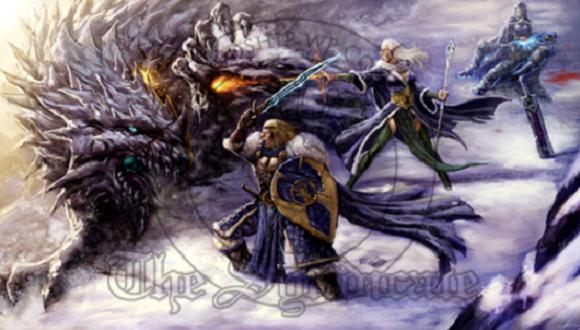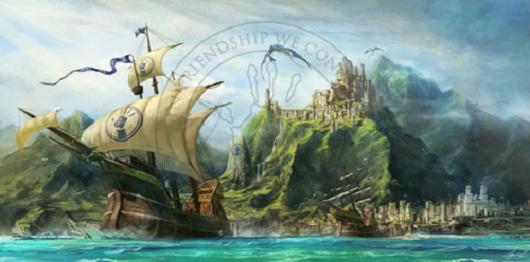This week, Sean discusses the other major focus of his book: guild management. In part two of our interview, he talks about the keys to running a longtime, successful guild. He also discusses how guild management has changed over the years and how his guild has evolved and grown to become drama-free.
Massively: In your time as an MMO guild leader, what's the biggest change you've seen in the MMO landscape?
Sean Stalzer: Maturing and evolving player expectations. When MMOs were first created, we were all so naive. We had this idea we could "win" the game. We had strange ideas of what we could do within a game both to ourselves and to others. There were all kinds of posturing going on in those early forums, melded with grandiose predictions. We had no concept of raiding or even "endgame" content at all. We barely understood the genre and had no idea of the untapped potential that lurked just a few years down the road.
Today things are an entirely different animal. While there are still lots of young, naive, fresh faces in gaming, those "early years gamers" are all now in their mid-30s. They have 10-15 years (or more) of gaming experience and a whole new set of mature expectations. That makes things very difficult on developers because they have to meet those expectations or the player outcry can ruin a game before it even goes live. Open beta with less than a complete feature-set has been the undoing of many games. Building a AAA title these days is a hundred-million-dollar expense. That is a massive risk to take on, making the next World of Warcraft (in terms of revenue generating potential), and it is because of continually evolving and growing player expectations. It will be interesting to see how long expectations can continue to grow before developers can no longer afford to take the risk to make a game that is all things to all people (and when that day comes) how players will adapt to the "new normal" that emerges from it.
One of the interesting things that I found in 10 years of managing guilds is that at first, we viewed each other more as our avatars, and then over time, we began to get to know each other, to the point that we now look past the avatar and see each other as who we are outside of game. Have you experienced that with The Syndicate? And if so, how did it change the atmosphere of the guild and the way in which you run things?
I don't think your experience is typical, else most guilds wouldn't fail within a year or two. That said, when things click within a guild such as you describe, that is when it ceases to be a guild and becomes a community. It is when drama begins to stop happening. It is when understanding comes before jumping to conclusions. And it is at that point when gaming gets really fun. You are fortunate to have had that metamorphosis occur in your guild.
We have definitely experienced that with The Syndicate. Ten years ago, we started an annual event we call SyndCon. Over 200 members get together each year now (with nearly 500 of our existing members having attended one or more SyndCon events) for five days. Those events turn avatars into people. Drama is non-existent in our guild. Turnover/attrition is gone. In terms of how it changed the way I run things, it allowed me to stop spending time putting out fires and managing one crisis or another. Instead, the team runs itself, and I am able to focus on creating opportunities for the members to grow and expand their friendships. I spend almost no time dealing with the typical issues that guilds face on a day-to-day basis as those issues simply don't exist here anymore.
Your guild is different from many other guilds in the sense that it's almost a business. With that, you have advantages that other guilds don't have, such as name recognition, a much bigger pool of applicants, and an easier time getting them to follow your rules. Is there any advice that you'd give guilds that don't necessarily have those luxuries?
I would definitely recommend focusing not on what anyone else is doing but on what you hope to achieve. While we play MMORPGs, the simple fact of the matter is that no one else matters. No one is going to come to your guild's funeral service when it implodes. No one is going to care whether you win or lose a fight. No one is going to care what your attrition rate is or what your rules are. The only people who care are in your guild, and thus they deserve the entire focus. Don't compare them to others. Don't hold them to standards based on what others have done. Focus entirely on what you hope to get from the guild and what you need to grow within the guild to achieve those results. I would also recommend reading the book, of course, and walking through the S-U-C-C-E-S-S methodology. If you do it methodically and truthfully, a very positive result can be obtained.

The success of any organization begins with quality recruiting. Recruiting is the lifeblood of a sports team, a corporation, or a guild. If you do not get the right people, you will fail. Figure out who the "right" person is for your goals and style and then seek out and recruit only those people. Don't recruit some jerk of a tank just because you need a tank. Find the tank who meets your values, goals and playstyles. I go into that in much more detail in the book. It's the longest chapter in the SUCCESS model because it is the most important.
In your book, you said, "The Syndicate has several core qualities that we expect in our members. We did not, however, sit down and spell these out from day one of our guild. Rather, we evolved into them and paid for the lessons in blood, sweat, and tears over the first few years of our existence." Out of the lessons you learned over time, is there anything that you might have regretted, a time when you wish you could turn back the clock to do over?
I think the natural human reaction is to look back and say AHA! I should have not done XXX! I reality those mistakes helped shape us as much as our successes because we used them as learning opportunities. I would certainly like to have avoided a few of them, but had they not occurred, some important lessons may not have been learned and thus some doors may not have been opened. So sure, right after (or during) a mistake, I guarantee there were times I would have paid to be able to roll back the clock, but viewing them in the lens of hindsight and using that to mull through those situations for information and strategies for the future... those mistakes helped us become the success that we are. I heard a quote recently that successful (people, companies, teams etc.) are built on a string of failures, and it is because they learned from those mistakes and got better each time that they ultimately achieved success. Regretting mistakes offers no value. Learning and improving from them is one of the stepping stones toward become better.
Thanks again to Sean for taking the time to talk to Massively. For those of you interested in reading more, The Syndicate: Beyond the Legend is available at Lulu and soon at Amazon.


